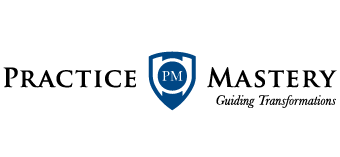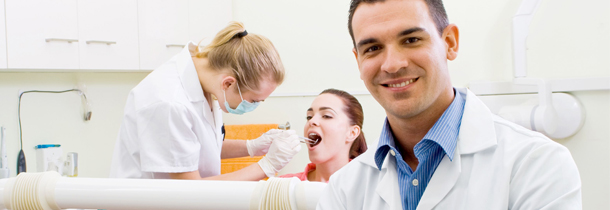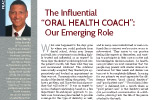The Influential “ORAL HEALTH COACH”: Our Emerging Role
Firstly, there has been a definite shift among the population from wanting to be regarded as “patients,” to one in which they view themselves as “health care consumers” with unique concerns, expectations and needs. “Consumers” who are more informed and in many cases misinformed or even confused (due to internet and excessive access to information). They arrive to our practice feeling like experts in themselves, and wanting to participate in their care as active and knowledgeable decision‐makers. As healthcare providers we must remember that two people may present with similar clinical circumstances but their needs and desires can turn out to be completely different. In caring for our patients we must appreciate the difference between “good clinical dentistry” and “good patient care”. “Good clinical dentistry” is delivered into a mouth where as “good patient care” is that dentistry served (via personalized communication & collaborative planning) into the life of the person attached to the teeth.
Secondly, dentistry is in a period of rapid transformation! The scope of available services is expanding vastly. There has been a definite shift from the reparative dentistry model to one where we are more focused on prevention and the enhancement of beauty and comfort. Today our work as clinicians is being conducted and delivered on a modernized playing field as well. Technology has transformed the dental experience for patients across the globe. Procedures are delivered so quickly and expertly that it’s becoming difficult for patients to feel apprehensive. With advances in research and technology today’s dental professionals have access to incredible materials, diagnostic aids and tools of the trade that not only take away some of the discomfort that was associated with sitting in the dentist’s chair, but they also streamline the experience so that it takes less time and becomes a more comfortable and even enjoyable experience. To stay on top of all these clinical advancements dentists are embracing much more continuing education and training. One of the biggest examples of this is the emergence and recent accelerated expansion of dental implants into the marketplace; as well as the number of clinicians offering them as solutions within their practice. Many experienced clinicians are also deciding to advance their existing implant skills by taking more advanced training with the aim of becoming even better at delivering these life enhancing solutions to their patients.
Firstly, there has been a definite shift among the population from wanting to be regarded as “patients,” to one in which they view themselves as “health care consumers” with unique concerns, expectations and needs.
The pursuit of clinical excellence is an honorable virtue. But what about expanding our ability to collaborate with patients who are rapidly evolving as healthcare consumers as well? The blunt reality is that we can only grow our clinical skills if we are in the routine “practice” of delivering what we are trained to do. This is where the patient/consumer can become either a catalyst or a barrier to our skill development depending on how we approach them. Most practitioners would experientially agree that the success of a modern dental practice depends entirely on how effectively it can influence patients to want optimal dental health. There is across the board agreement by respected clinicians and opinion leaders that “communication” is the core competency that will inspire your patients to trust you and to work more collaboratively with you in pursuit of their best dental health interests. This means that our entire collaboration must be converted from the all too common one-sided regurgitation of dental information (product and services dump) to a more interactive process that gets patients involved and guides them towards discovering for themselves that which is in their best interest.
In order to communicate more inspiringly each dentist must first begin to change the way they see themselves and their role in the care of their patients. Dentists/specialists are much more than highly skilled clinicians schooled in art and science of diagnosing and treating oral health conditions. You are also “oral health coaches”. When you feel your role as a coach, this in itself will begin to infect your communication to become more inspiring, more supportive, and more patient centered and solution driven. Remember the old adage “when you change the way you look at things the things you look at change”. It strongly applies here! As oral health coaches, you must take the time to see beyond the mouth to listen, understand and guide patients in self-discovery so that they are able to come to comfortable conclusions in their own mind and be more committed to those choices.
In our role as oral health coaches, how can we communicate more effectively? It begins by understanding that human beings are emotional creatures who process all decisions they make with their emotions/feelings. This means that when our patients walk into our practice they walk in with all of the emotional baggage related to past experiences as well as things that are going on in their life at that time, i.e. trips, career, work challenges, relationships, general health concerns, family matters, financial demands, self-image and self-esteem issues, etc. For basic procedures that are mostly covered by insurance we can often get away with telling them what they need without focusing on their current life circumstances and they’ll usually accept treatment. However, when the fees get higher and the complexity of care becomes more involved we must factor into our communication the fact that patients have a life outside the office. With the patient in the driver seat we must embark on a co-discovery journey of fitting the dentistry into their lives not into their mouths. To do this well we must reconnect with our authentic non-dental self. Which is the way we thought and spoke before the world of dentistry started crowding out our thinking with dental terms and industry jargon. This is why social skills are so important. These have little to do with talking, or having the “gift of gab”. They’re more about communicating with people by asking questions, listening, understanding and having empathy and rapport.
Your oral health coaching skills are developed when you ask questions and listen, when you focus to understand different behavior or communication styles, and when you adjust your style to fit other people’s styles. It’s the ability to understand the unspoken. To read body language! To pick up on voice tones, inflection, and facial expressions. It’s being able to intuitively crawl inside other people, then think and see the world as they do. It’s the willingness to listen to people without biases, and to understand their viewpoint. To suspend your view of how things are and understand their beliefs and opinions. Excellent coaching skills will help us jump onto other people’s trains of thought and ride with them as co-passengers. This is the stage on which the fullest scope of modern dental services can be inspired and delivered.
We are helping people to make decisions that can add to the quality of their lives.
It is important to remember that effective communication through an oral health coaching mindset has important benefits beyond case acceptance. It will also empower you to more constructively fulfill the important parameters of informed consent. Like many other professionals in the field of health care, dentists often struggle to fulfill these ethical and legal obligations. Practitioners must be mindful to ensure that they apply proper principles and judgment when seeking informed consent for treatment. In this day and age, the mere fact that someone sits down in a dental chair does not amount to giving consent. Obtaining informed consent involves a process of “effective communication” – a mere signed piece of paper may not suffice in the absence of a “meaningful dialogue” with the patient. Any discussion about consent to treatment should take place before treatment. This discussion needs to include information about the expected benefits of treatment; risks and side effects; alternatives to the proposed treatment, including the likely result if no treatment is done; materials to be used; any unique personal circumstances of the patient; and estimated fees to be charged. The dentist should ensure that he or she answers any questions the patient may have as well.
By reminding ourselves that dentistry is a helping profession, we will see more value in “oral health coaching” as a desired and supportive means to an end. We are helping people to make decisions that can add to the quality of their lives. By altering your thinking and approach slightly you can easily shift the focus from “us” and our procedures to “the patient” and the quality of life impact our services can have on their lives. This shift in thinking will enable us to communicate with our patients in a more mentorship based, collaborative and inspiring way.
Modern dentistry is bright and filled with opportunity when you choose to expand your clinical excellence while concurrently taking the time to grow as “oral health coaches”. “Oral health coaching” is the emerging yardstick that will differentiate you to become more effective as clinicians while feeling more trusted and valued in the eyes of your patients.


 Originally Published in
Originally Published in 
